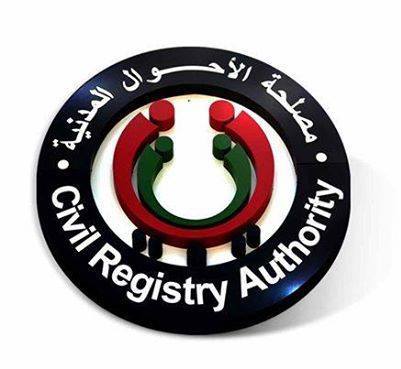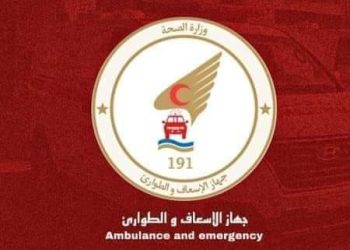The Tripoli based Libyan Prime Minister, Abdel Hamid Aldabaiba, held a meeting last Tuesday at his Cabinet Office to follow up on the Intilaqa project, which aims to organise and match electronic Civil Registry data with data on paper records.
The meeting was attended by Acting Interior Minister, Imad Trabelsi, the head of the Administrative Control Authority, the head of the Civil Registry Authority (CRA), Major General Tariq Al-Thaman, the head of the Passports, Nationality and Foreigners Affairs Authority, Major General Youssef Murad, the Minister of State for Cabinet Affairs, in addition to members of the committee in charge of the Intilaqa project.
The head of the CRA gave a visual presentation explaining the stages of the project, which concludes the stage of updating the database with the developments extracted after completing the entry, matching and assembly works and the stage of checking and correction.
Data of 1.8 million Libyan families matched – last matched in 1970’s
He explained that the number of CRA offices that completed matching and scanning reached 257 offices at the level of Libya, where the data of 1.8 million Libyan families were printed, with a completion rate of 97% of the total Libyan families. He pointed out that this project has not been completed since the mid-seventies of the last century.
The importance of clean CRA data
It is important to keep in mind the pivotal role that the CRA plays in Libyan politics, economics and society. All Libyan nationals are issued a unique National ID Number by the CRA.
Only with a valid National ID Number can a Libyan citizen obtain a mobile SIM card, a passport, open bank account, obtain hard currency at a preferential official exchange rate, get married and vote, etc. A National ID Number also gives citizens access to some of the government grants. Hence the validity and providence of National ID Numbers is critical and politically sensitive.
Fake National ID Numbers
It will be recalled that a controversy had exploded over the alleged existence of ‘‘a huge number’’ of fake National ID Numbers.
In January 2022, speaking before a parliamentary (HoR) session in Tobruk, Mohamed Bettamer, the then head of Libya’s CRA denied the existence of ‘‘large numbers’’ of forged National ID Numbers.
Bettamer said no documented evidence had been presented to his authority. Moreover, he said while there are cases of individual forgeries, the CRA’s research does not indicate evidence of ‘‘large-scale’’ forgeries.
Fake ID Numbers led to the postponement of the 2021 elections?
It will be recalled that one of the reasons cited for postponing the 24 December 2021 elections was a secret report by the Libyan Intelligence Services of forged National ID Numbers resulting in forged election cards. The unpublished report was read out in the 27 December 2021 HoR session.
Between 250,000 to 700,000 fake National ID numbers?
Various HoR members leaked the content of the report, revealing that there were between 250,000 to 700,000 fake National ID numbers.
In the January 2022 HoR session, Bettamer had asked for the HoR’s support for the CRA’s Intilaqa project which aims to cross check the CRA’s paper records with its computer records. This would take 6 months, he had said, subject to funding.
CRA database has been subject of controversy for years
The head of the CRA admitted that there were many more errors in the CRA database when he took up office and that there are still errors today, but he said they were exaggerated. He would not offer an estimated figure but said that they are nowhere near the one million fake National ID Numbers alleged in the media in 2020.
When pushed during the interviewed, he had said he doubted if there were even half a million. He said the CRA has conducted annual audits and a million or even half a million fake IDs would be difficult to conceal.
Cleaning the database through Project Intilaqa
However, Bettamer said the best way to ‘‘clean up’’ the database is to implement the CRA’s Intilaqa project which aims to manually compare the CRA’s paper records with its electronic records.
New system was due to be launched in 2021
Bettamer had said irrespective of receiving funds for Intilaqa, the CRA has been working for a year on a new improved system which will improve the accuracy of its database.
Ready now for elections and issue of hard currency Annual Family Allowance
Despite these errors, Bettamer had said in 2020 that the CRA and its database were ready to act as the bases for holding elections or for the disbursement of the Hard Currency Family Allowance.
Spat with CBL
It will also be recalled that the CRA had had a public spat with the Central Bank of Libya (CBL) over the accuracy of the CRA database.
The CBL had complained that the CRA database was inaccurate and had created its own database and linked it to an operating mobile phone number to disburse allowances and hard currency.
But the CBL and CRA had gone on to form a Joint Committee which Bettamer said had reduced database errors greatly.
There had been claims post 2012 that the database was the subject of corruption when the CRA was split and there was an attempt to politicize it. Bettamer had denied that the CRA has issued National ID Numbers to foreigners or mercenaries.
Tatweer and PWC launch Intilaqa
As a result, the CRA brought in consultants Tatweer who with the help of PWC, launched project Intilaqa to ‘‘clean’’ the database, by returning to the paper-based records.
Civil Registry Authority taken over by ‘’extremists’’ (libyaherald.com)
Civil Registry Authority head released (libyaherald.com)
CRA discovers more than 4,000 forged documents in its Beida paper archives (libyaherald.com)
ibya’s Civil Registry Authority completes first batch of ‘Tamkeen’ trainees (libyaherald.com)
CBL to unfreeze 2018 hard currency allowance disbursements after treating large cases of ID fraud










